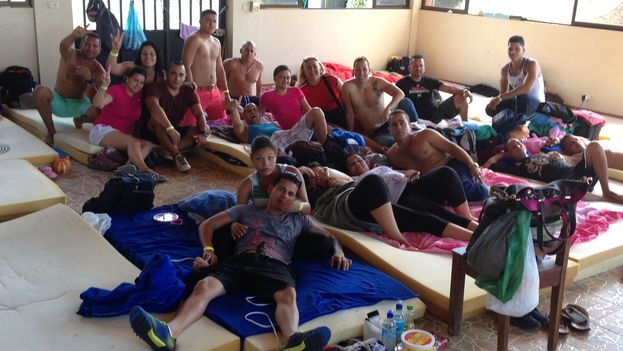
![]() 14ymedio, (With information from EFE), Mexico, 28 December 2015 — A total of 250 Cuban migrants stranded in Costa Rica will benefit from a pilot project agreed to this Monday in Guatemala, among the member countries of the Cental American Integration System (SICA) along with Mexico, according to the office of the Mexican Secretary of Foreign Affairs, who spoke with this newspaper. The test will take place at the beginning of January, the Foreign Ministry said, and if all goes well Cuban migrants will continue to be evacuated via this route.
14ymedio, (With information from EFE), Mexico, 28 December 2015 — A total of 250 Cuban migrants stranded in Costa Rica will benefit from a pilot project agreed to this Monday in Guatemala, among the member countries of the Cental American Integration System (SICA) along with Mexico, according to the office of the Mexican Secretary of Foreign Affairs, who spoke with this newspaper. The test will take place at the beginning of January, the Foreign Ministry said, and if all goes well Cuban migrants will continue to be evacuated via this route.
After hours of meeting, the Guatemalan Foreign Ministry made a brief public statement, without offering more details, declaring, “It was agreed to undertake a pilot project of humanitarian transfers in the first week of January, and a working group has been formed that will be responsible for the necessary coordination for the first transfer.”
Minutes later, the Costa Rican Foreign Ministry added that the Cuban migrants will leave by air from Costa Rica to El Salvador, from where they will be taken by bus to Mexico.
Once in Mexico, the Cubans will be granted an exit permit already allowed under that country’s immigration laws. This exit permit, according the Mexican National Institute of Migration, is valid for 20 days and is granted to citizens declared “stateless.” In the case of Cubans, this happens when the Cuban Consulate is advised by the Mexican authorities of the entry of a citizen with a Cuban passport, and the consulate remains silent or denies that the citizen is Cuban.
According to the Mexican Foreign Ministry, there are no plans to accompany the Cubans arriving from Costa Rica to the US border.
Costa Rica has granted nearly 8,000 special transit visas to Cubans since 14 November, but last week announced that it no longer has the capacity to continue receiving the islanders, and so has ceased to issue these documents in most cases.
The crisis was generated on 15 November when Nicaragua closed its border to Cuban migrants, citing security risks to its sovereignty and stranding thousands of Cubans who are now in Costa Rica and Panama waiting to continue their journey through Central America.
Representatives of Guatemala, Belize, El Salvador, Honduras, Costa Rica, Panama and Mexico, as well as the International Organization for Migration (IOM), met Monday on the outskirts of the Guatemalan capital to discuss this immigration crisis, which finally found a solution more than a month after the Cubans began to be stranded in Costa Rica, which led Costa Rica to leave the political discussions of the Central American Integration System (SICA).
Costa Rican Foreign Minister Manuel Gonzalez described the results of Monday’s meeting as “positive” and said in the official statement released in San José that he could not fully detail the technical and logistical aspects of the transfer, out of respect for the discretion requested by some countries.
“We hope that these agreements can materialize in the short term. Unfortunately, this season of the year makes it impossible to move faster,” he said.
On 18 December Costa Rica suspended its participation in the political affairs of SICA due to the lack of solidarity among countries in the region to allow the passage of Cubans and solve the humanitarian crisis.
“It is satisfactory and a reason to thank those countries who showed their good will,” said the Costa Rican Foreign Minister Monday, after the agreement reached in Guatemala, but he did not specify if the government had decided to fully restore relations with SICA.
But this decision, celebrated by Costa Rica and all the participating nations, should not be interpreted as “a precedent” in the region, but an action to address “a temporary situation,” said the Guatemalan Foreign Ministry, which also said that it would convene the Regional Conference on Migration (CRM) to address this issue in its entirety.
The participating countries also reaffirmed their commitment to combat human trafficking networks, and said they would apply “without delay” the law which severely penalizes this illegal activity, and that “unfortunately obliges countries in the region to return to their country of origin all persons entering their territory in an unauthorized manner.”
“This will be addressed to prevent irregular migration and to firmly combat the crime of human trafficking, and primarily to protect the integrity of migrants and ensure respect for their fundamental rights,” said Guatemala, a country through which migrants transit and that every year suffers migration firsthand.
